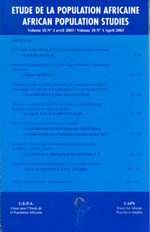
|
African Population Studies
Union for African Population Studies
ISSN: 0850-5780
Vol. 32, No. 2, 2018, pp. 4305-4318
|
 Bioline Code: ep18038
Bioline Code: ep18038
Full paper language: English
Document type: Research Article
Document available free of charge
|
|
|
African Population Studies, Vol. 32, No. 2, 2018, pp. 4305-4318
| en |
Impact of internal migration on fertility in Cotonou, Benin Republic
Banougnin, Boladé Hamed; Adekunle, Adeyemi O.; Oladokun, Adesina & Sanni, Mouftaou Amadou
Abstract
Context/Background: In developing countries, fertility is usually higher in rural than urban areas. This is partly due to lower access to and utilization of reproductive health services in rural areas. However, migration to cities may alter the fertility behaviour of migrants from rural areas.
Data Source and Methods: The study used 2012 Benin Republic Demographic and Health Survey data and focused on married women aged 15-49 years and residing in Cotonou (n=722). Tobit regression was employed for the multivariate-level analysis.
Findings: The results showed that migrants adapt gradually to the fertility patterns of non-migrants. This gradual adaptation is compounded by a relative selectivity of migrants whose fertility preferences are similar to those of non-migrants. Finally, recent migrants for employment or school reason had the lowest number of births over the past five years, which supports the disruption hypothesis.
Conclusion: The migration-fertility relationship depends on the length of residence, migrant’ socioeconomic characteristics and reason for migration.
Keywords
Migration; fertility; urban areas; Cotonou; Benin Republic.
|
| |
© Copyright 2018 - African Population Studies
Alternative site location: http://www.uaps-uepa.org
|
|
